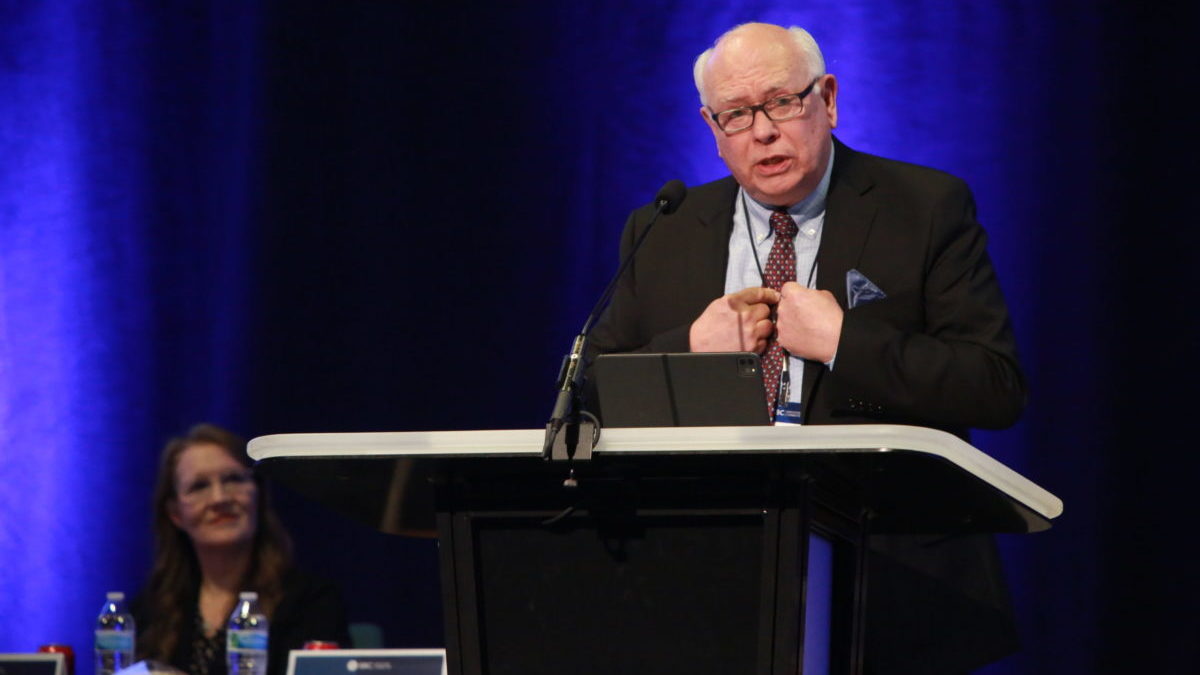At this year’s Southern Baptist Convention Annual Meeting in Anaheim, when messengers elect new officers, one consistent officer nominee will be missing — longtime recording secretary, John L. Yeats, the Missouri Pathway reported Tuesday (March 8).
At the close of the 2022 Annual Meeting in Anaheim, Yeats completes his 25 years of service that began with his election in Dallas in 1997. Yeats, executive director of the Missouri Baptist Convention, made his announcement to the MBC Executive Board on March 7.
“For 25 years, Sharon and I have been honored to serve Southern Baptists in this vital role,” he said. “Each nomination speech was humbling, and they all mentioned Sharon and the invaluable role she serves in this work. As Missouri Baptists know, Sharon and I are a combo package. We have served together, side by side, in this ‘behind the scenes’ work in collaboration with the wonderful Executive Committee professionals.”
Third-longest tenure for recording secretary
Yeats has the third-longest tenure for recording secretary in Southern Baptist history. Only Lansing Burrows (31 years–1882 to 1913) and Height C. Moore (26 years–1919 to 1946) exceed Yeats.
The primary work of the recording secretary is to document the proceedings of the Convention’s sessions.
Each SBC recording secretary has made a contribution to improve the processes so that there is an accurate historical record made of the Southern Baptist Convention’s Annual Meeting. Through the years, there have been significant automated improvements to the collection processes but the office serves as a check and balance for historical and legal accuracy.
“We have loved our opportunity to serve the Lord by serving Southern Baptists,” Yeats said.
“We pray the next SBC recording secretary discovers, as we have, the incredible value of our Cooperative Program and its multi-faceted, multi-ethnic, multi-generational vision of shining the light in the sea of lostness.”
Yeats added, “I am confident that the Lord has raised up several leaders in our Southern Baptist family who are capable of fulfilling this important role in the Convention. They must be willing to surrender their schedule at the Annual Meeting to the work.”
As a part of his doctoral studies, Yeats wrote an orientation manual for the recording secretary. It featured a panoramic history of the SBC recording secretaries and a brief synopsis of Southern Baptist ecclesiological practice as it relates to the role and responsibilities of the recording secretary. A copy of the manual is posted online at JohnYeats.net.
The day before the first session begins, the recording secretary is responsible for training volunteer pages about the processes used by the Convention. That includes how to secure vital information from the messengers who want to make a motion, amend a motion or comment on a motion.
When the Convention begins its first day of SBC business, it is not uncommon for the recording secretary to be the first officer to arrive on the platform and the last to leave. After the session, the work of editing the proceedings for the Daily Bulletin with the executive committee staff must be completed for publication.
Once the Convention is over, the recording secretary delivers the final review of the proceedings within three weeks to the Executive Committee staff so they can begin the process of publishing the SBC Annual.
At the conclusion of the Annual Meeting, the recording secretary composes a letter, processed by the Executive Committee staff, to every new SBC trustee or commissioner. This is the formal recognition of their new responsibilities.
By July, following the last session of the Convention, the recording secretary completes the final edits to the SBC Annual. While the Executive Committee staff assimilates and prepares the document, the recording secretary is responsible for the accuracy of the content submitted for publication in the SBC Annual.
By the first of each March, the theme of the Convention is determined and the recording secretary writes the Foreword for the SBC Book of Reports, and the final copy of the book is proofed for publication by May 1 of each year.
While there has been some discussion in recent days about the recording secretary’s participation as a member of the SBC Executive Committee, the meetings in September, February and June are a small part of his responsibilities. Because SBC forefathers placed the recording secretary as an ex officio member of the SBC Executive Committee, the recording secretary has often been seen as the voice of “institutional history.”
A person considering service in this role must be able to attend every session of the Convention from start to finish. He or she also must be able to edit, proofread, multitask, train volunteers and be acquainted with parliamentary procedures and Baptist polity and history.
Four keys to being SBC recording secretary
Paraphrasing from his dissertation, Yeats points out four distinctive keys every recording secretary should acknowledge:
1. The person who holds the office must approach the work humbly. “It is an honor to serve the messengers of the churches.”
2. The recording secretary must recognize that every Southern Baptist messenger has the privilege of expression, whether by vote or by comment. “By mutual respect for one another, the Convention and its officers extend honor to every messenger.”
3. A major part of the work of the recording secretary is the orderly documentation of the Convention’s business and reports.
4. The perceived power of SBC officers, including the recording secretary, is derived from influence, not commanding or managing an agenda. “The true power of the SBC rests with the local church – the headquarters of Baptist life.”
EDITOR’S NOTE — This story was was written and originally published by The Pathway, newsjournal of the Missouri Baptist Convention.








